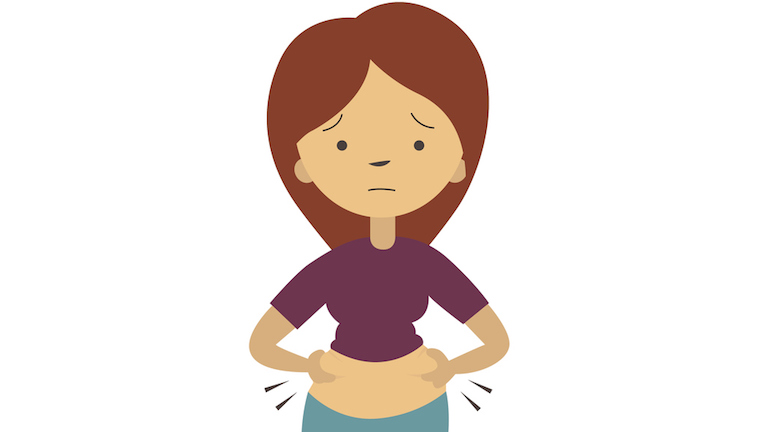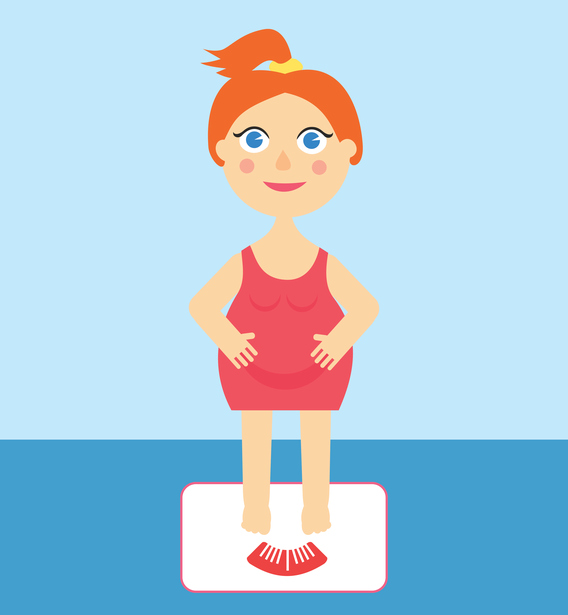If you’re doing everything right but still can’t lose weight around your belly, your stressful lifestyle maybe to blame for your fat tummy, says health expert Jackie Wicks, co-author of new book Cheats & Eats: Lifestyle Programme
You’re doing everything right: eating less sugar and fat, exercising almost every day and saying no to wine o’clock. Yet, while the rest of your body seems to be shaping up, there’s nothing, but nothing you can do to shift that pesky fat around your middle. You can blame getting older, that lager habit or the weather. But there’s one cause you can actually do something about – your stressful life. The real reason you can’t shift the fat around your waist, says Jackie Wicks, creator of one of the US’s most successful weight loss programmes, PEERtrainer and co-author of the new book, Cheats & Eats: Lifestyle Programme may lay in your high-pressure lifestyle, because of the effect the stress hormone cortisol has on fat storage around our tummies. Here she explains the connection and gives tips on what you can do about it.
The cortisol connection
Excess fat around the middle can be caused by an imbalance of cortisol, a stress hormone created in the body’s adrenal glands. Cortisol is a hormone that is essential to give us the get-up-and-go we need to get motivated and focused, which is why it’s usually elevated in the morning. Its also released during exercise and periods of acute stress and regulates energy by choosing the required amount of either carbohydrate, protein or fat from the food we eat that the body needs to deal with what we’re facing.
You may have heard of the ‘fight or flight’ response that occurs when you’re faced with a stressful event. During this, cortisol is released from the body’s adrenal glands and floods the body with glucose (the simplest form of carbohydrate and preferred energy source) to give muscles an immediate supply of energy. Insulin (the hormone that reduce blood sugar)is also releases to prevent the glucose being stored as fat and make it freely available to give you the immediate energy to deal with the event. Once the stress is addressed, hormone balance returns to normal.
That’s in an ideal world where all your stressors are short-lived as they were in our ancestors day, when their biggest worries were escaping from sabre-toothed tigers. But our stressors are chronic, meaning have no real end in sight – bad bosses, toxic relationships, money worries. So, while a little stress is good for you and can give you the energy to get through say, a job interview, work challenge or exam, when it’s chronic and ongoing and you’re always worrying about things you can’t control such as a high workload, job security, difficult relationship or bereavement, your cortisol may be constantly raised. As a result, you may feel overwhelmed, constantly tired or wound up. You may also be anxious, depressed or find it difficult to make decisions, concentrate or get to sleep.

Such chronic stress, research has shown can not only impact your immune system and raise your blood pressure, increasing your risk of heart disease, it can also cause you to gain weight and to have difficulty losing weight. If you’re reaching for sugary snacks to deal with your stress, drinking or smoking, that can affect your weight. Chronic stress as well as a poor diet and being overweight can also increase inflammation which can further exacerbate the problem.
Raised cortisol levels caused by chronic stress have also been linked to weight gain and a study carried out by researchers at University College London (UCL) published in the journal Psychosomatic Medicine found that people who had higher levels of cortisol in their bodies tended to have larger waist measurements and a higher body mass index than those with lower levels. Further research published last year from UCL in the journal Obesity linked high cortisol levels to higher incidences of obesity.
How excess cortisol gives you excess belly fat
Firstly, cortisol can release fat from storage and send it to your belly, which in itself may also increase the production of this hormone. Secondly, high blood glucose teamed with the insulin suppression that is caused by excess cortisol can starve cells of energy. The body responds by sending hunger signals to the brain, which may lead to overeating. In this case, any unused glucose will get stored as fat in the body. Thirdly, cortisol may affect appetite and cravings as demonstrated in a study published in the journal, Psychoneuroendocrinology that showed an association between raised cortisol levels and higher calorie intake in women.
3 signs you have belly fat caused by stress
If you have fat around your belly that you can’t shift, there are a few other signs to watch for that could signal an imbalance of cortisol is to blame.
You’re ravenous all day
Stress causes an increase in appetite. if you feel like you could eat another four meals after finishing breakfast or dinner or you often have that all-day need to snack, especially on sugary or fatty foods, you may have an imbalance of cortisol.
You feel overwhelmed
‘I can’t deal with this!’ is a common cry I hear from clients I see with cortisol imbalances. it’s that feeling that if someone gives you one more thing to do, one more decision to make or one more problem to solve, you will explode, break down – or both. That too is an imbalance of cortisol.
Exercise makes you want to stuff your face
After exercise, do you feel so ravenous you could eat a giant hamburger or plate of pasta rather than a healthy meal such as chicken/fish and vegetables? If you feel so hungry after exercise that you want to eat foods that are super-high in calories, you may well have an imbalance of cortisol – or you may be doing exercise that is too hard and fast and thereby raises your cortisol levels too high.
5 ways to combat stress belly
I co-wrote the Cheats & Eats: Lifestyle Programme with Healthspan nutritionist Robert Hobson as a plan to help put your hormones back on track. Here are some key ways you can help balance cortisol from our programme:
Eat high nutrient density foods
We created the Cheats & Eats Programme as one in which no food is off limits. Everything is either an Eat or a Cheat. You get unlimited Eats, which are very high micronutrient dense foods. These are foods such as vegetables and wholegrains and low fat proteins. Those could mean for example, a delicious heap of roast or steamed vegetables with lean chicken or a fillet of salmon, some fresh tomatoes and basil drizzled with olive oil, cucumber sprinkled with dill – the list goes on and on. There is a dull list of Eats in the book but some examples include green vegetables, black tea and coffee, green tea, most fruits, most beans, lean proteins and healthy fats such as walnut, olive, coconut and avocado oils.
Go on cheat yourself
In the Cheats & Eats Programme, the diet doesn’t end there. We suggest that 20 per cent of your plate be Cheats. That means if you want the bacon, the wine, the chocolate, the butter have it, just have it in small amounts. Examples of Cheats on the plan include alcohol, cream, fried foods and take aways as well as crisps, sweets and high fat meats. The idea is that the kind of stress you put yourself under when depriving yourself on a strict diet is not sustainable long-term because increases your stress levels so end up bingeing or suffering the fattening effects of excess cortisol, so you literally cannot win in the weight game. This way, you have a more sustainable way of eating that balances out your hormones and your stress levels by allowing you to treat yourself.
Walk 10,000 steps a day
Walking is not only a great way to burn calories, it also actually helps you clear your head by helping boost the levels of potent brain chemicals like serotonin, dopamine and norepinephrine, all of which are essential to a happy mood. The 10,000 steps a day target sounds like a lot but really only amounts to about half an hour of walking a day. But if you think about it, the average person walks about 4000 steps a day without making much effort you can quickly get to 10,000. Once you reach that, challenge yourself to get to 12,000 and then 15,000. By using an activity monitor, you’ll be surprised at how competitive you get with it (and yourself).
Take regular baths
Taking hot baths regularly has been shown to lower cortisol levels and this is something that anyone (with a bath) can do. Even if you only have two minutes, spending time on yourself, using aromatherapy you love will relax you by engaging your senses. Plus, as your body temperature rises during a hot bath, endorphins – your body’s natural feel good chemicals – are raised.
Use quick mind tricks to relax your mind
Lowering your stress levels doesn’t have to mean meditating for an hour every day, a few mind hacks I have up my sleeve always work for me. My first trick: ‘What other people think of me is none of my business.’ That works when I think someone may eb critical of something I’m doing or when someone actually says something critical to my face.
The second trick I use when I start to freak out is that I ask myself: ‘Is there anything I can control here?’ Most of the time there isn’t and once you realise that, it instantly diffuses the situation, giving you a healthy detachment from the outcome of things you have no power over.
The third trick is a relaxation exercise I learned from sleep experts Mitchell and Olga Stevko. Sit down, take a breath and focus on a colour that relaxes you. Put whatever stresses you out in the middle of that colour, whether it’s a friend or a family member of or a task or whatever. Give it an image in your mind and then make it smaller and smaller. You can even ‘shoot’ it with a gun our cannon if you like. As the stressor disappears, replace it with an image or idea that makes you happy and make that image bigger and bigger. This might sound woo-woo but I find it’s the easiest way to stop stress in its tracks.

based on a simple list that divides foods into two categories: Cheats and Eats. Find out more here.
Like this article? Sign up to our newsletter to get more articles like this delivered straight to your inbox.






















































